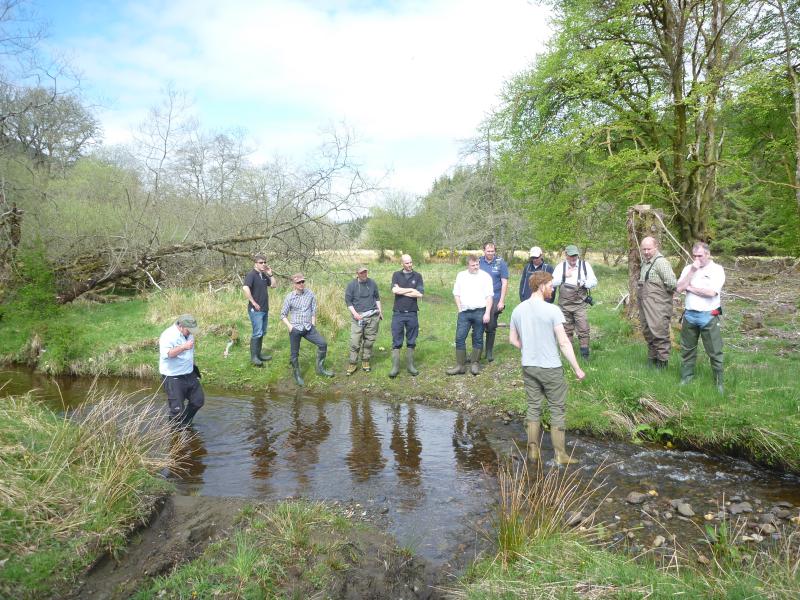Catchment Based Approach

The Wild Trout Trust works with Catchment Partners to deliver river habitat improvement projects and advice on habitat management, using our specialist expertise to complement local knowledge.
Detailed below is some background to the Catchment Based Approach (CaBA) and some examples of partnership projects. More examples of Wild Trout Trust Projects can be found here.
Background to the Catchment Based Approach
Many of the problems facing rivers have their root causes in the catchment: diffuse pollution from fertilisers and pesticides coming from farmland, silt from roads and fields, lack of flow due to abstraction of ground water, flashy spates due to upland drainage. These are big issues and need co-operation between farmers, water companies, government agencies and organisations like the Rivers Trust and the WTT to resolve. And they need to be tackled at a catchment level so that they impact the whole river from source to sea.
In England and the Welsh borders, the EA and Defra have adopted a ‘Catchment Based Approach’ (CaBA) and appointed over 100 ‘Catchment Partners’ who will lead the development and delivery of a Catchment Plan to resolve these issues. The Catchment Partners are locally based Rivers Trusts, Wildlife Trusts and similar charities.
The WTT is working with Catchment Partners in the same way as we have always worked with groups who have any involvement in a river or lake. We will provide advice, deliver projects and, increasingly, train volunteers and professionals to enable them to deliver their Catchment Plans.
Click on the names below to find established examples of working with Catchment Partners
Bayfield Project Norfolk
This ground-breaking river restoration was project managed by Tim Jacklin of the WTT, with technical design provided by Professor Richard Hey. The project was delivered as a partnership with the support of the landowners, Roger and Robin Combe, Norfolk Rivers Trust, the River Glaven Conservation Group, and funded by the DEFRA Catchment Restoration Fund under the Nine Chalk Rivers Project partnership led by Norfolk Rivers Trust.
River Douglas Catchment partnership:
Hosted by Groundwork North West this vibrant partnership is making achievably ambitious plans for the restoration of a Lancashire river associated with Orwell’s Wigan Pier. Habitat, community and education works are scheduled and the WTT has been a key member of the steering group ‑providing high-level technical input as well as advising on educational and engagement tools. The WTT will also be helping to deliver activities and habitat improvements identified in the plan in the coming years.
http://www.groundwork.org.uk/Sites/riverdouglas
Partnership with the Arun and Rother Rivers Trust
Just one of many projects carried out between the Wild Trout Trust and Arun and Rother Rivers Trust; work carried out at Fittleworth focused on creating optimum habitat for coarse fish fry and provides refuge during high flow events. Coarse fish fry have very limited swimming ability and a lack of backwater habitat results in small fish being flushed downstream and over structures with no route back.
http://www.sussexangling.co.uk/News/ArticlesDetails.php?ID=36
Stoke-on-Trent Catchment partnership:
Hosted by Staffordshire Wildlife Trust there are already proposals afoot for both pilot and ongoing river-channel works in urban reaches of the Trent Catchment (tributaries and main river) in the Stoke-on-Trent region. The WTT are involved in drawing up and submitting proposals for re-instating natural processes into modified and impacted urban river reaches.
http://www.catchmentbasedapproach.org/humber/staffordshire-trent
The WTT have a very long-standing relationship with the Wandle Trust — being formed around the same time and also originally providing seed-corn funding to help the Wandle Trust gain momentum. Holding our biennial “Urban Conclave” on the banks of the Wandle in 2011 proved a great training opportunity for UK-wide grass-roots urban river restoration groups. It also saw the breaking of the embargo on in-stream habitat modifications within densely-populated areas of London.
Wear Angling Action Project
Hosted by Wear Rivers Trust, this project aims to increase and secure long term angling club memberships through the provision of coaching opportunities and support for clubs wishing to take action in improving their own sections of river. As part of this project, WTT, in partnership with Wear Rivers Trust, provided walkover assessments and reports for angling clubs, detailing habitat improvement work to be undertaken as part of the project. This ongoing collaboration is helping Wear RT to increase the scope of the project and deliver practical habitat workshops.
Useful links and information (all these links will open in a new window)
Catchment map and list of catchment partner lead organisations (PDF): click here
Catchment Based Approach website and forum. This website is aimed at Catchment Partners and includes a wide range of tools and materials as well as a forum for asking questions and sharing information: http://www.catchmentbasedapproach.net/
Environment Agency Catchment Based approach information: click here